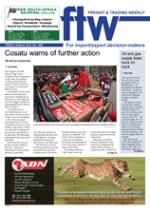The Congress of South
African Trade Unions
(Cosatu) will not compromise
on the issues of scrapping
e-tolling and banning the
practice of labour brokering
according to its spokesman,
Patrick Craven.
Craven told FTW last week
that government had been
given seven working days to
respond to its calls following
one of the biggest marches of
post-apartheid South Africa to
date on March 7.
“The march was an
overwhelming success not
just in terms of size, but also
in that it was very disciplined
– with a clear message to
government that we will not
compromise on the two issues
at hand,” said Craven. “While
it is very hard to calculate the
exact figures, the estimates
are that some 200 000 people
participated in the mass action
nationally.”
Craven said this was just
the first of many initiatives
planned – echoing the
sentiments of Cosatu general
secretary Zwelinzima
Vavi who told marchers in
Johannesburg that the union
would fight the “economic
apartheid” introduced by
government to the bitter end.
That the union carried a
powerful punch became clear
as placard-carrying union
members took to the streets,
bringing business across the
country to a standstill. The
South African Chamber of
Commerce and Industry
(Sacci) has estimated that the
cost of the action could be as
high as R10 billion.
According to Business
Unity South Africa, the
march may have been a major
political coup but it hit South
Africa hard.
“Busa does not believe
that last Wednesday’s mass
action has strengthened the
South African economy or
created new jobs, or taken the
discussions on labour broking
and e-tolling any further.”
Cosatu however disagreed.
Craven said they had possibly
drawn a line in the sand for
government which had some
major decisions to make. “If
they do not respond to our
demands or decide not to
make any changes to their
policy they will have to face
the consequences.”
According to economist
Mike Schűssler, businesses
should be able to recoup
their losses within a week
or so, but, he said, industrial
action on this scale was not
beneficial to the country.
Sacci also warned that more
strikes such as these would
send a negative message to
foreign investors.
According to Craven,
Cosatu is very clear about
what they want from
government. “First and
foremost, they must scrap the
Gauteng e-tolls as they will
add a burden to the poor in the
country, they will perpetuate
exclusion and they represents
nothing but privatisation,” he
said. ‘Secondly, they must
abandon the practice of labour
brokering completely.”
Andre Kriel, general
secretary of the Southern
African Clothing and Textile
Workers’ Union, said labour
brokering was nothing
more than a form of human
trafficking. “It feeds off
workers, robbing them of a
decent income, denying them
job security and converting
humans into simple
commodities.”
Cosatu warns of further action
16 Mar 2012 - by Liesl Venter
0 Comments
FTW - 16 Mar 12

16 Mar 2012
16 Mar 2012
16 Mar 2012
16 Mar 2012
16 Mar 2012
16 Mar 2012
16 Mar 2012
16 Mar 2012
16 Mar 2012
16 Mar 2012
Border Beat
Featured Jobs
New
